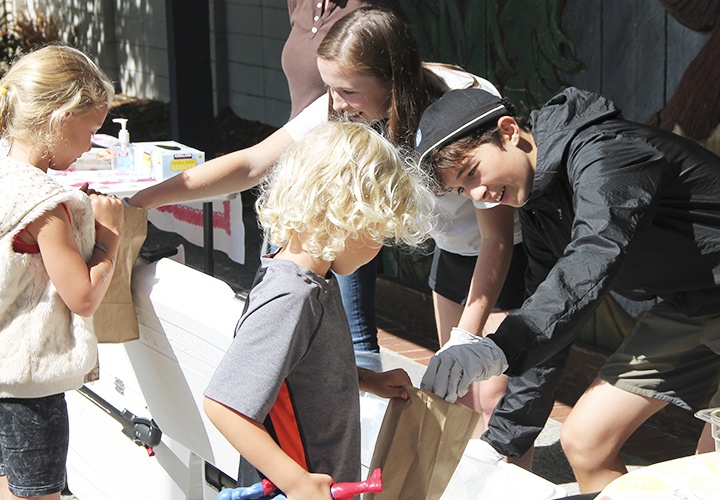With September marking Hunger Action Month, Vashon’s food bank, senior center and the Interfaith Council to Prevent Homelessness are starting a campaign to raise awareness about hunger in the community.
Vashon Maury Island Community Food Bank Director Robbie Rohr said that the campaign is important because “there are a lot of misnomers about what Vashon is like,” especially when it comes to the island population struggling with food insecurity.
At the food bank’s Picnics in the Park program this year, which offered free lunches every weekday to island children and teenagers all summer, Rohr said volunteers served between 66 and 68 lunches each day.
“Last year, the average was 45, and the year before that — the first year — it was 35,” she said. “That’s about 2,800 meals served this year.”
When calculated to exclude repeat attendees, Rohr said about 420 people received the lunches.
She attributed the increase in attendance to better marketing and outreach efforts, as well as to the fact that she believes the picnics have become a part of Vashon summertime culture.
“It’s just a good time,” she said. “Ober Park is a lovely area, and I think it’s a good place for people who are new to the island to mingle.”
However, she also noted that numbers are up for the food bank’s twice-weekly distribution program. In 2015, nearly 21,000 islanders visited the food bank; 28 percent of those were seniors, she said.
Additionally, between 18 and 25 people every week participate in the food bank’s home delivery program.
Although 2016 is not over yet, she said distribution numbers have been “up a little bit every month this year.”
“Hunger is increasing,” she said. “I think it’s partly because of the housing crisis. Housing, food and utility insecurity are all linked. Our goal would be that no one experience hunger or the inability to secure enough healthy food.”
With that in mind, Rohr decided to partner with the Vashon Senior Center and the Interfaith Council to Prevent Homelessness (IFCH) in an effort to raise awareness about hunger and who is hungry on Vashon through posters and public service announcements.
“We need to do more outreach,” she said. “Who’s hungry on Vashon and what can we do about that? There has to be public will to change the problem, policies and systems.”
The outreach effort will conclude with a community forum later this fall discussing what can be done about the issue. The food bank hosted a similar forum last fall that called on the community to discuss the issues surrounding hunger and asked islanders to think about the factors and life events that contribute to hunger and food insecurity.
Included in the food insecurity picture is Vashon’s senior population, which Rohr said the food bank serves nearly 30 percent of.
Ava Apple, director of the Vashon Senior Center, said last week that the campaign collaboration with the food bank seems like “a natural collaboration,” given what the center does to feed seniors. The senior center serves free, hot lunches four days per week to 20 to 30 seniors, provides transportation to and from the meals and delivers meals through Meals on Wheels.
“We’re pretty sure that we (the senior center and the food bank) serve a lot of the same people,” Apple said. “I think it’s a great opportunity to collaborate with another nonprofit. There’s only so much money and donors on this island.”
Meanwhile, IFCH’s own meal program provides free, hot dinners Monday through Saturday and lunches on Sunday at island churches. IFCH’s Nancy Vanderpool said Monday that the meals serve 20 to 30 people every day. The nonprofit also works with the Vashon Island Growers Association to help those in need secure healthy, fresh food.
For Vanderpool, the most important part of raising awareness about hunger is “cutting through people’s bias” that those who receive free or reduced-price food only get processed, unhealthy foods.
“That’s just not true,” she said. “Something I’ve noticed is, for the most part, it (food available to those who need it) has grown in variety. That’s why it’s so important to have the food bank, where people can get the basics to make food, free meals and access to fresh fruits and vegetables. It’s important that we’re all working together.”
A date for the community forum to discuss hunger on Vashon has not yet been set, but will likely take place in October.



